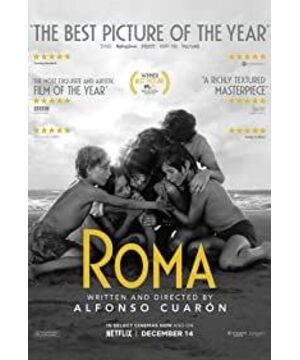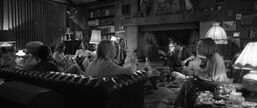Thanks to Alfonso Cuaron for his genius, his experiences and his creative impulse to share with the world.
I just wanted to write a movie review, but the rush of thoughts in my head fueled my ambitions, and let's see where I can stop.
There have been many reviews of Roma, and there will be more (it deserves it). I'm just an idler, I haven't watched many movies seriously, and I'm not related to the industry. What I want to talk about is just what I noticed and what it brought me, on the one hand it is metaphysical, on the other hand a little bit of thinking about film as art caused by Roma.
The first time I watched Roma on the small screen on Netflix, the shock was inevitable, and I had a vague feeling that it must have a stronger presence on the big screen. Because I'm already familiar with the simple and unpretentious plot, Roma didn't disappoint me after the second play in the theater, and it still grabbed my attention the whole way. And when we don't have to focus on subtitles, backgrounds, and superb photography skills, we can focus on details and emotions, and this, in my opinion, is where Roma truly surpasses the director's predecessor. Bar.
1. Two metaphysical points
One is the sound effect, which is very different when you watch it at home and in a movie theater. The sound effects of the whole movie are very good. The sound of the waves in the last part is higher than the next wave. Through the dynamic sound, the tension is brought out, which is far better than all BGM can do. But the real essence is the background sound effect that appears repeatedly in a noisy environment. It really makes the fake real. The audience seems to be watching a movie in a movie theater. The noisy but whispered whispers are not on the screen, but in the movie theater. Left and right front and back. At the entrance of the cinema, the picture and sound are also perfectly matched, perfectly expressing confusion and loneliness. The noisy voice around and the deliberate group portrait clearly tell the audience that this is just a trivial one in the world. People, her experiences and emotions, have nothing to do with this world.
Another is to express emotion by focusing on individuals outside the story. Among them, there are two that impressed me, the singer in the fire and Cleo in the delivery bed.
The former was the only one in the forest fire who did not participate in the firefighting. He pretended to be an evil spirit in the forest and sang songs that no one could understand in the fire, as if he was a traveler from another time and space. He doesn't play any narrative role (unless the lyrics mean otherwise, but from what I've checked, the song is a Norwegian folk song), but everyone is his background. He is not in the story, but outside the story, he is the embodiment of the audience in the movie, taking us to that moment, but it does not exist here, just like a dream.
The paragraph produced by Cleo further strengthens the sense of substitution. After the child is born, the doctor's first aid is the focus of the narrative of this paragraph, but the camera is always locked on Cleo's side, the story takes place at the far end, and the plot is through the doctor's formulaic dialogue and action pushes (played by real obstetricians and nurses). But we won't be attracted by what's going on in the plot, our attention is all on Cleo, and the sense of substitution at this time makes me feel great pain as a man, and even can't bear to watch it. Every breath of Cleo, who turned his head, was responsible for the expression of emotion, while the doctor's mechanical protocol was responsible for telling the story.
2. Roma and the meaning of narrative
This section is the driving force that drives me to write this film review. It can be said that I wrote the first paragraph just to appear not to be critical. I have seen some audiences (both Chinese and foreign) criticize this film mainly on the weakness of its plot, the story is too simple to support the plot, the criticism of XX is insufficient, the director as a middle class does not know the sufferings of the people, and the oppression and the oppressed Preserving petty bourgeois fantasies, keeping track of the times, too personal movies, and so on. Although the voices of criticism are few, I still have a few unpleasant remarks.
I actually can't understand why, more than 30 years after Milan Kundera was introduced to China, we still can't get rid of the desire and emphasis on grand narratives. If a work contains some kind of family and country feelings, some thoughts that are higher than individuals and families, it is self-evident that it is more noble and better. Jin Shengtan said, "The realm is big or small, and it is not based on the merits." Even if those noble ones are really noble, are they more valuable than the joys and sorrows of ordinary people? In my opinion, "fire at me" is by no means better than "I support you". We can prefer the former, but there is no right to say that just because sacrifice is greater than love, it is indisputably better.
Going back to the Roma film, what Alfonso Cuaron wants to make is a personal film adapted from personal experience, and it does not need to criticize or promote anything. This is an experience of his childhood, the story of his family, and his ambition is very limited. It is to tell a little story of that era with Cleo as the protagonist. True, it was a time of great change, both for the country and for the individual, but he had no responsibility to tell about the great change from the very beginning. This is not, after all, a modern history of Mexico, nor is it propaganda material that attempts to explore class contradictions. Roma is, after all, Alfonso Cuaron's nostalgia for his childhood, and he just showed it in the form of a movie. Actually, I have a rather radical view. Movies no longer need to tell stories. Movies, like paintings and poems, can be freed from the shackles of narrative, and their purpose is to express the director's own emotions.
Roma is such a work, it is intended to express the director's emotions, for that era, that family and those people, that death and new life, it intercepts the front and back of a recurve point, and expresses it perfectly. It has no responsibility to be great or to praise and criticize anything, it is just the heart and love that Alfonso Cuaron fell into remembering that moment, in the form of a movie, so perfectly expressed.
ps. Too sleepy, I will revise + polish the day after tomorrow
View more about Roma reviews











